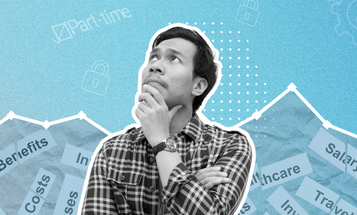
Why the Rich Don't Think They're Rich. And Why It Matters
Under 2 percent of American workers make over $200,000 a year, so if you're part of that sliver you're doing amazingly well in the grand scheme of things. A lot of your fellow countrymen -- say, the 60 percent of Americans who make under $35,000 a year -- would probably consider you "rich." But it's less clear whether you would consider yourself rich.
The evidence is mixed on how the rich see themselves. A 2012 Gallup poll found that 2 percent of Americans self-identify as "upper class," which is remarkably close to the portion of people who make over $200k.
On the other hand, one recent survey found that "Of those with investable assets worth $1 million to $5 million, only 28% answered yes to the question 'Do you consider yourself wealthy?'" Even many respondents with $5 million or more in assets didn't consider themselves wealthy. This in a country where nearly half of all households own no stock at all, even indirectly through retirement accounts.
Other surveys have found the same thing -- that millionaires just don't feel like millionaires. Or think a few million is enough to be rich, when median household wealth in America was $68,828 in 2011.
So why don't the rich see that they're rich? No doubt the biggest reason is that, if you are making a six-figure salary, you're probably doing it in an insanely expensive part of the country -- like New York or San Francisco. Which means you're competing for status and housing with lots of people even richer than you.
Data shows that the vast majority of high-earners live in the most costly regions of the country. California, for example, with the highest housing costs in the country, had 609,844 tax filers who reported incomes over $200,000 in 2006, more than the Deep South and Prairie states put together. The states with the lowest cost of living -- like South Dakota, Mississippi, and Nebraska -- all have the lowest number of high earners. And vice versa.
What all this means is that when politicians or pundits talk about the "rich," the people they are often talking about think that they are actually talking about somebody else. So then when the time comes to impose higher taxes, many of the rich think they are being picked on unfairly. Two doctors struggling to afford a jumbo mortgages, medical school debt, and everything else in Brookline may think, "wait a minute, we're not rich. Why are we getting hit with a tax increase?" And that makes equity policies a heavier lift.
As I've written here often, many affluent Americans are totally clueless about just how little money most people make in this country -- since all the people they know went to college and are making at least mid- to high-five figures. Would affluent Americans think differently about inequality if they knew that 60 percent of Americans make under $35,000 a year? Maybe. It's worth finding out by bringing more attention to the basic facts of who makes what, and who's rich.



